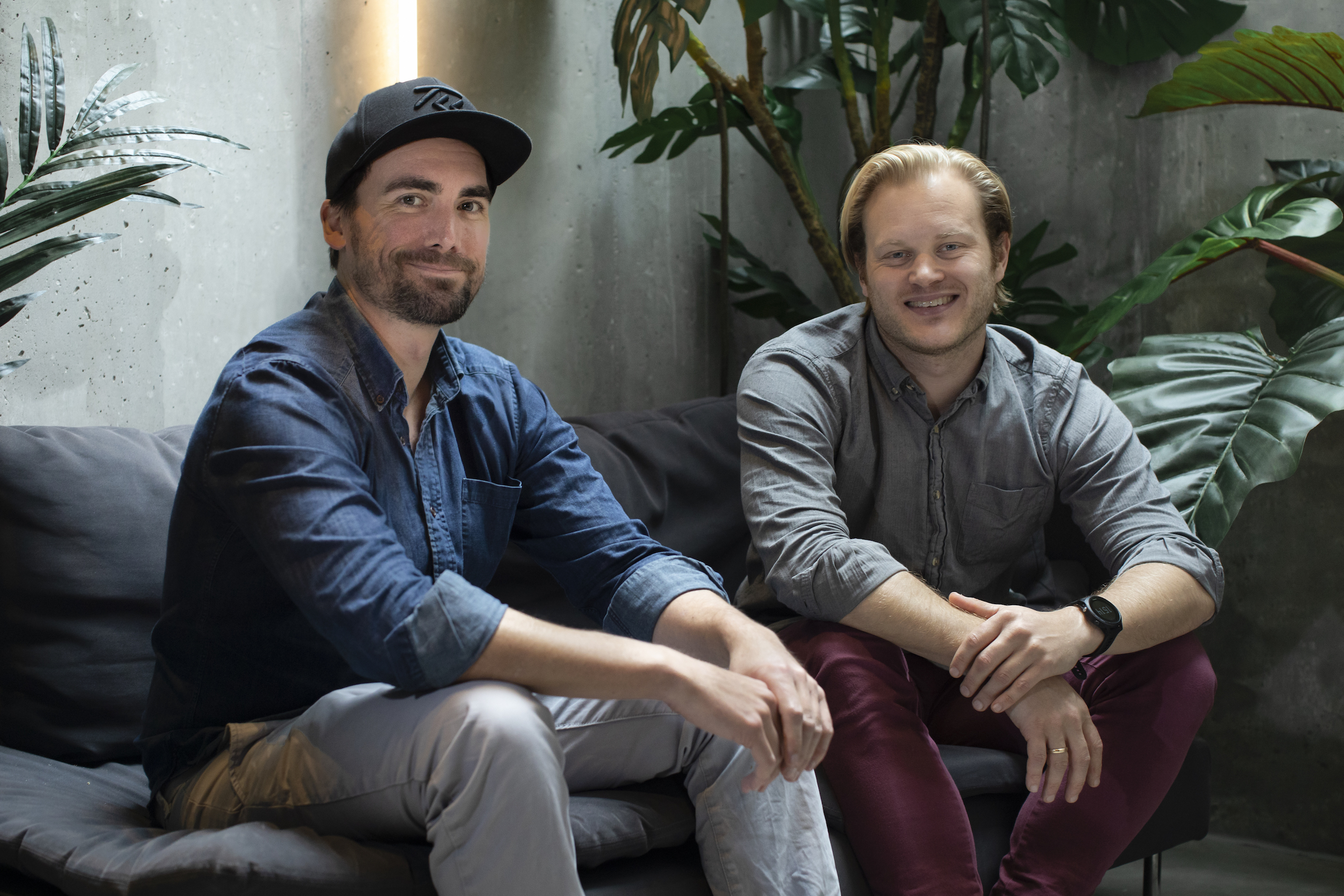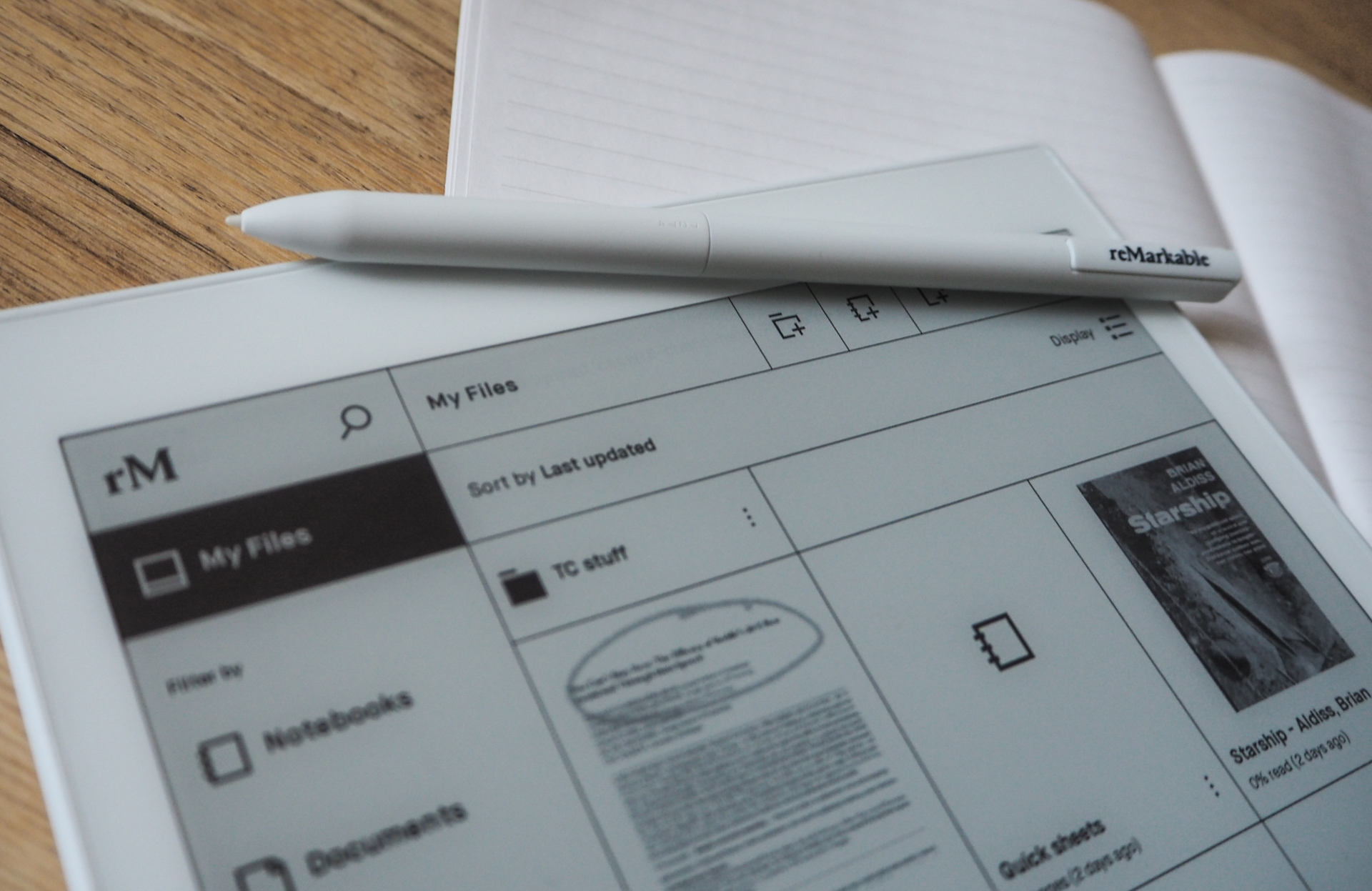The reMarkable tablet is a strange device in this era of ultra-smart gadgets: A black and white screen meant for reading, writing, and sketching — and nothing more. Yet the company has sold 100,000 of the devices and now has attracted $15 million in series A funding from Spark Capital.
It’s an unusual trajectory for a hardware startup exploring a nearly unoccupied market, but CEO Magnus Wanberg is confident that’s because this category of device is destined to grow in response to increasingly invasive tech. Sometimes an anti-technology trend is the tech opportunity of a lifetime.
I reviewed the reMarkable last year and compared it with its only real competition, the Sony Digital Paper Tablet. It was launched not on Kickstarter or Indiegogo but with its own independent crowdfunding campaign — and considering we’ve seen devices like this attempt such a thing and either let down or rip off their backers, that alone was a significant risk.
The device has been a runaway success, though, selling over 100,000 units — and attracting investment in the process. When I talked with Wanberg and co-founder Gerst about their new A round, the conversation was so interesting that I decided to publish it in full (or at least slightly edited).
How did they get here? What would they have done differently? Is the threat of the “smart” world really a thing? Why fight tech with more tech?
Devin: So you guys raised some money, that’s great! But it’s been a while since we talked. I think it’s important to hear about the progress of unique companies that are doing interesting things. So first can you tell me a little about what the company’s been busy with?
Magnus: Well, we’ve created this wonderful product, the reMarkable paper tablet. We’ve been very focused on that effort, based on a love for paper and a love for technology, to see if we can find some ways to join these two together to help people think better. That’s sort of the the whole ethos of the company.
So for the last six years, we’ve just been grinding away… you know, we’re a small player up against the big guys on this. So we’ve been sort of fighting guerrilla warfare trying to trying to establish ourselves.
And we were successful, fortunately, when we did our pre-order campaign, because as we found out, we weren’t the only ones who who love this notion of thinking better with the paper tablet, seeing paper as a powerful tool for thinking and for creating.
We just turned over to 100,000 units sold, and we have grossed over $60 million in sales worldwide. And we’re closing on 100 employees. So our first take, our original idea of the reMarkable tablet, has seen traction. This is our third year in market and we have yet to see or find a hardware startup that did better commercially.
Devin: Yeah, when I was testing out the reMarkable, I was bringing it around to a lot of events, and everybody was very curious. Everybody was interested by it, whether it fits into their workflow and or it doesn’t, everybody wanted to touch it and play with it. There was almost nobody was, you know, not interested. So what has your feedback been like after launch? What do you think you need to add on or change to pursue that ‘better thinking’ philosophy?
Magnus: One of the most frustrating things about working at reMarkable is we have so many ideas where we want to take this, we literally just hired a full time person to organize all these ideas into a strategy.
We have so many ideas where we want to take this, we literally just hired a full time person to organize all these ideas into a strategy.
But I think what we’re going to focus on and where this funding can help us, is making the product fit even better into different kinds of workflows. We have a lot of ideas from how to improve that.
We also had a great response to our handwriting conversion feature that launched before Christmas last year, we’ve seen great traction on that. And people are loving just kind of typing up their meeting notes, pushing a button and becomes text. That’s definitely an avenue we’re going to keep pursuing and adding features on, because I think we’re just getting started on the possibilities there.
And we have some secret features, they’re just going to blow people’s minds. While I’m not going to talk about it now, I think a lot of people are going to be really surprised what we are going to come up with in the next year or so. So yeah, it’s gonna be great. I’m smiling. You can’t see that now. But I know all these secrets, and they’re really great.

reMarkable CFO Jeremy Gerst (left) and CEO Magnus Wanberg.
Devin: And why are you raising money now?
Magnus: So we have this great pre-order community. It started backing our company and for us, you know, it started feeling a little bit like a like a movement towards better better thinking, and a little bit in opposition to tech. We’re not anti-tech, that would be quite hypercritical given that we are a tech company, but it’s kind of more human tech.
When we had this commercially successful pre-order, we picked up some interest from a lot of investors in Europe, in the U.S., and in Asia, all over. And because of this community that supported us, we were really selective about any investors that we wanted to bring along for this. I think it’s close to 100 VCs now who’ve reached out from all over the world, and we resonated with Spark.
Devices designed for more focused purpose, not sort of… do-it-all notification machines that don’t let you get into things before they use the snap you back out of them.
What we think what we agree on is the importance, at this moment in time, of our type of technology. And with the rise of all the gadgets, and all the distractions and notifications, the lure of technology, and technology addiction, and all these kind of things… how it makes more and more sense to create focused devices that are more human, that allow people to think better. Devices designed for more focused purpose, not sort of… do-it-all notification machines that don’t let you get into things before they use the snap you back out of them.
We essentially told them that we’re going to create this new category of devices. And that just resonated with them, so we closed our funding, just recently. So now we have this money, that’s good when you’re sort of the underdog, to get a small war chest.
We want to use that money to build the company, to get more employees, to put that into product development, to create value for for the existing community that supported us through the pre-order and in market, but also for future customers. So that’s like the number one focus, improving our core offering. And if you think a little bit ahead, of course, we have big plans that might go outside of software as well.
Devin: What would you have changed about the way that you launched the products? Whether it’s, you know, the campaign you did, or the methods or what features you launched with, what would you have done differently if you could advise yourself now as a successful hardware startup?
Magnus: Of course, in hindsight, even though we’re in a really good place now, especially with this funding round, there are things that we we could have done differently. I think one of the, not the mistakes that we made, but a strategy that I might have done differently is that we were so insecure about, you know, are people going to love this thing?
It took us a year to sort of catch up with our own ambition level and our own insecurities.
So we launched with a lot of features, to make sure that everybody could like something. But when we came closer to launching it, we saw that with a really small team, when you add a lot of features, it takes time to make the those features bug free. So to be honest, the initial product had a lot of bugs. Now that the product is a lot more stable, we realized that the product we launched was not perfect. It was ready to go, but definitely very rough around the edges.
We had 20 or 25 core features, if we had done 10 or 15, we could have polished those a lot more. That’s something I definitely would revisit to see if we could have done fewer things, more focused things, and have them polished up. It took us a year to sort of catch up with our own ambition level and our own insecurities.

I think a lot of startup teams feel really insecure, and then you can get into this mindset where there’s kind of a scope creep. Look at any video on Kickstarter. They always, always promise and under deliver — that’s the norm, right? There’s a kind of inflation. As a start up, you’re competing against these other pre-order campaigns for early adopters shared wallet. So we felt forced a lot to add a lot of features to make sure we weren’t the only guys on the Kickstarter scene that didn’t have you know, a thousand features.
If we had confidence I think we could have said, Yeah, it does these, core things really well, and then we’ll add more later. So that that’s kind of a hype in the whole pre-order scene that I think we could have managed a little bit better.
Devin: When I talked with you guys a little after launch, you mentioned that E Ink was interested in your technology, and there was a possibility of working together. Did that ever pan out? Are they still a partner?
Sure, part of our story is how we invented this low latency technology that translates into a great writing experience. And that’s once of our secret sauces. That’s the thing that E Ink was most interested in at the beginning.

But after we launched, and they saw the traction, they began to realize here that the technology is unique to this company, so maybe we should be talking about licensing. But then we had strong growth in sales, and the product keeps getting better, and they realized that this company is unique too, we’re the biggest guys in this category by far. So our relationship with E Ink has just gotten deeper and deeper, it’s definitely now a partnership. Barely a day goes by at reMarkable without us having discussions with E Ink.
Barely a day goes by at reMarkable without us having discussions with E Ink.
Devin: A lot of the people I work with aren’t really aligned with your vision of simplifying and thinking better. I am but, you know, that’s why I’m the one talking to you. These people are the notification hounds, on Twitter all the time, gettting notifications for everything, so it feels natural that they’d want to choose maybe an iPad Pro with a stylus. I show them a reMarkable and they say, well I can write on my iPad too, but it also does this and this and this. So what is your reply to someone saying that?
Magnus: We don’t consider ourselves being remotely near competitive, not because of performance, just because of purpose. Our purpose is to complete the device ecosystem, and the iPad has, in our opinion, has huge gaps in what it can offer humans. I have an iPad Pro, it’s great. But when I want to do some things, I go to the reMarkable.
And to the people say, I love my Pro, it can do everything reMarkable does, I respectfully disagree. I’ll agree that the iPad is a great product. But you know, when was the last time they really sat down and had a focused work session on an iPad, sat 2, 3, 4 hours really thinking about something, what was the last time they use that to really read the book, or take focused notes, or try to solve a problem visually?
What we’re offering is something that complements the iPad. It’s for people who use paper as an as a method, not just like a material. The paper method is to not be distracted, but to be focused on one thing over a period of time.
What we’re offering is something that complements the iPad. It’s for people who use paper as an as a method, not just like a material.
Because focus is such a scarce commodity, it’s so fragile, doesn’t take a lot of temptation or interruption to to make focus evaporate. So this is at the core of what we do we we think that humans need more focused product because we simply can’t help ourselves sometimes.
I think more and more people as technology seeps into our lives are realizing that wow, it’s great to have a device that just lets me be alone with my thoughts, lets me focus, because we sort of force you to focus.

An Amazon representative demonstrates the company’s Alexa-enabled ring.
Devin: Yeah, it’s a different sort of style of thinking I do when I go out to a cafe with my laptop, versus when I go out with the reMarkable, and I’ve got a couple papers, stuff I’ve been working on. It’s something I can focus on directly rather than just sort of changing where I’m doing the same kind of work.
Magnus: We are tracking, of course, a lot of trends. We talk to a lot of people in the industry and a lot of journalists, and of course our customers. We think it is a global trend, this early stage of awareness of how technology is disrupting our thinking. Some of us who are very sensitive about it, to really have strong feelings on better thinking, we’re starting to get it, but a lot of people are still haven’t been made aware of it.
How can we create technology that takes care of people, that isn’t intrusive, that doesn’t steal attention away, but actually gives it back?
Devin: It’s funny you mention that. Did you see what Amazon announced yesterday?
Magnus: I saw an article. Wow, they launched a lot of stuff. Very aggressive, along a lot of different lines. Did you think there was something relevant to reMarkable?
Devin: No, just the opposite. You said that, when technology is always there, and you want to do something where it isn’t intrusive, and doesn’t take attention away. Amazon is working on the exact opposite. They want technology to be everywhere, all over your body, the glasses, the ring, they want, that they want to be able to reach you wherever. I’m curious about your thoughts on that ecosystem, where everywhere you go, everything you wear and have will be, for lack of a better term, smart?
Magnus: I gotta tell you, man, it scares the shit out of me. And I love technology. For the first time, I’m getting this dystopian vibe. Like, your ring, your watch, your living room stereo, in your pocket, in your car, you know, everywhere. I’m an engineer, I’m in computer science, I get it, I know how it works, I know what these guys are trying to do — and it’s scaring the shit out of me. For the first time, I don’t buy these products the minute they come out, you know? I get scared, and I tell my friends and my loved ones to be careful.
I gotta tell you, man, it scares the shit out of me. And I love technology. For the first time, I’m getting this dystopian vibe.
So my hope is that these large technology companies do this with a sense of integrity, that they realize what they’re doing to people’s lives and how they’re building it in. And I hope they have the sense of responsibility, because having a laptop in your bag or at work, that’s one thing, but when it’s all over your body, in your home, in your bedroom… It creates a greater sense of responsibility on the tech companies to to manage that data. When you’re on people’s bodies, it’s a different game than in people’s bags
So we’re small. We’re a hundred guys in Norway. We have our little guerrilla warfare, we’re fighting our way, respectfully we hope because, you know, I have an iPhone as well, I don’t want to be a hypocrite. But we have a position on this. And we think we can do just a little better in terms of creating technologies that people use.
